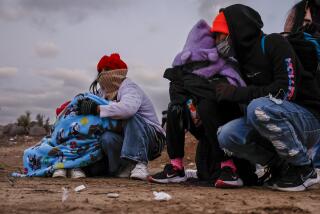S.D. Lab Tech Helped in Liberian Evacuation
- Share via
MADRID — A few days before Greg Huhn left San Diego to work at St. Joseph’s hospital in Liberia this April, the U.S. State Department issued a low-key statement mentioning political tensions in the country’s inland Nimba mountain range.
Less than five months later, the 25-year-old lab technician found himself carrying amputees and war orphans from the hospital in a rush to abandon the coastal capital of Monrovia amid bloody fighting there.
“I had no idea it was a war,” Huhn said Friday in Madrid, where he and 62 other refugees had arrived early Thursday after a complicated, four-day rescue from the West African nation organized by the U.S. and Spanish governments.
“When I got there, it was still a rebel incursion. It went from an incursion to a crisis and finally a war,” Huhn said.
He described the violence wracking the country of 2.3 million as “just complete terror.” At least 5,000 people have died in the nine months of fighting between two main rebel factions and troops loyal to President Samuel Doe.
Late last year, rebels led by Charles Taylor began incursions into northeast Liberia from neighboring Ivory Coast. They accused Doe, a former master sergeant who overthrew the government of William Tolbert 10 years ago, of rampant corruption and human rights abuse. The United States was Liberia’s main financial backer during the past decade.
Rebels, including a breakaway faction led by Prince Johnson, now control more than 90% of the country, and Doe is holed up in his fortified presidential mansion refusing to leave.
Huhn was at the Madrid airport again Friday to greet 12 Roman Catholic missionaries, also part of the St. Joseph’s hospital staff, who flew in from the Ivory Coast, a neighbor of Liberia.
Huhn’s group was accompanied by rebels through the jungle to the southern port of Buchanan. Unarmed U.S. Marines picked them up on the beach there, and helicoptered them to the amphibious assault ship Saipan.
Then they were airlifted to the amphibious transport dock Ponce, which carried them north to the neighboring country of Sierra Leone, where a Spanish air force plane was awaiting them.
The 27-year-old hospital in the Monrovia suburb of Congo Town, had been using emergency generators and well water since late June.
But the missionaries of the Spanish order of St. John of God that run the hospital decided to evacuate Saturday after heavy mortar and anti-aircraft gun shelling drove off most of the Liberian staff. They left everything behind.
Huhn said he finally became convinced it was time to leave when a mortar shell exploded 15 yards from the missionaries’ residence Aug. 10 as he and others were heading for the door.
“A lot of people were depending on the hospital, so I couldn’t just get up and leave. It was the only thing functioning,” he said.
Huhn, from North City West near Del Mar, said he left his job as an immunology researcher at the Research Institute of Scripps Clinic in La Jolla because he wanted to get beyond the laboratory and help people directly.
He found St. Joseph’s through a San Diego-based referral service, Amdoc/Option, and began performing a variety of tasks after his arrival April 7.
But, with the escalation of fighting his main duty rapidly became finding donors to bolster scarce blood supplies.
Increasingly desperate, he put up posters offering five cups of rice for 500 milliliters of blood. Within a few days, he was turning away would-be donors by the hundreds.
Huhn said he never became hardened to the grisly wounds and signs of wanton cruelty he saw every day in the hospital’s emergency room.
Two cases linger in his mind: a 9-year-old boy who had been shot in the arm by a government soldier after he refused to hand over his money; and a man out past curfew who had been forced to eat both his ears after soldiers sliced them off “so he could hear better.”
“I didn’t expect it,” he said of the cruelty. “It’s beyond belief.”
Like the missionaries, who say they will reopen the hospital as soon as possible, Huhn would like to return to Liberia, if only to visit those friends who remain alive and find out about those who died.
“I’d like to see a happier Liberia, a Liberia without suffering,” he said.
For now, the UC Berkeley graduate plans to return to Scripps. He said his experience has strengthened his desire to earn a medical degree.
More to Read
Sign up for Essential California
The most important California stories and recommendations in your inbox every morning.
You may occasionally receive promotional content from the Los Angeles Times.













